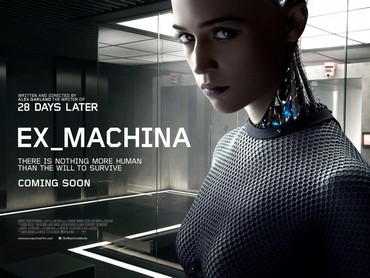Pages
▼
Wednesday, August 3, 2016
Ex Machina (Alex Garland, 2015)
Screenwriter Alex Garland's debut as director has a lot going for it: a tightly provocative and suspenseful Oscar-nominated screenplay (also by Garland), a superb trio of stars, and special effects that don't overwhelm the story. The effects won Oscars for Andrew Whitehurst, Paul Norris, Mark Williams Ardington, and Sara Bennett, overcoming competitors with far more flash and dazzle: Mad Max: Fury Road (George Miller), The Martian (Ridley Scott), The Revenant (Alejandro González Iñárritu), and Star Wars: Episode VII -- The Force Awakens (J.J. Abrams). For once, special effects were kept on the human scale, largely to present Ava (Alicia Vikander) as the ambiguous cross between human being and robot on which the screenplay's exploration of the ethics of artificial intelligence depends. Ava (whose name is a variant spelling of "Eve") is the creation of Nathan (Oscar Isaac), a superwealthy tech genius who made his fortune with an Internet search engine not named Google, which he uses as the software for his experiment. He lures a young coder, Caleb (Domhnall Gleeson), to his isolated retreat on the pretext that he wants Caleb to apply the Turing test on Ava. Nathan's unstated aims are far more extensive, and Caleb sees through them quickly. But neither of them is quite as quick on the uptake as Ava. Gleeson is convincingly geeky as Caleb, and Isaac, in yet another performance that establishes him as one of our most chameleonic actors, evokes the self-absorption and questionable ethics of any number of tech billionaires. But it's Vikander who steals the honors with Ava's sly mixture of naïveté and nascent cunning. The only thing I can fault Ex Machina for is a conventional sci-fi ending that feels out of keeping with the intelligent questioning of the middle part of the script and seems too much like a setup for a sequel.
Charles Matthews
